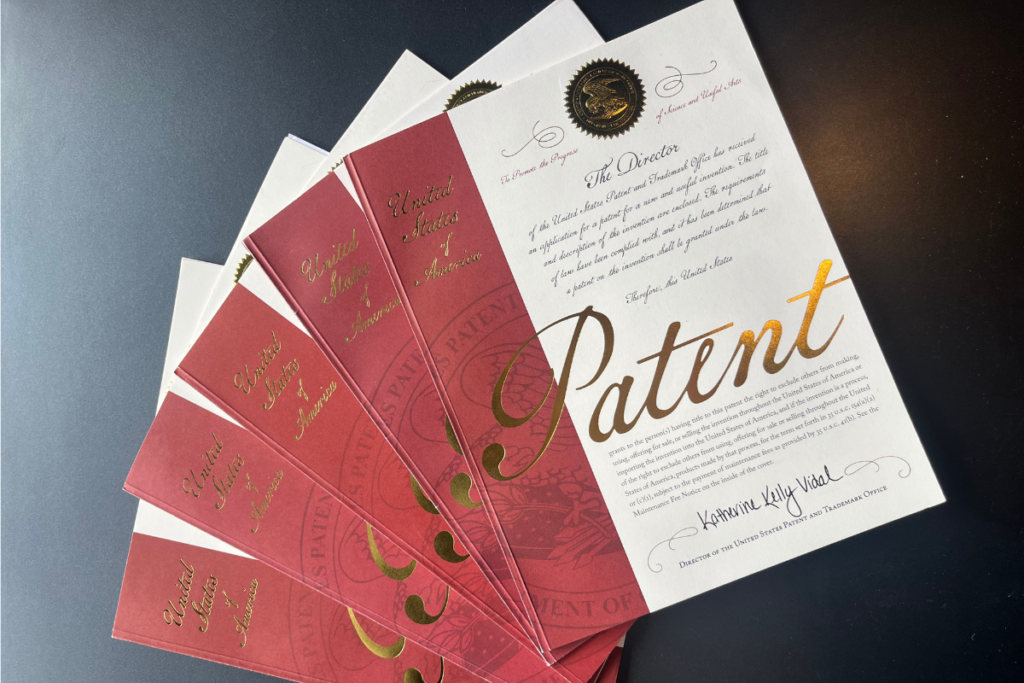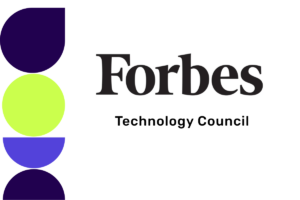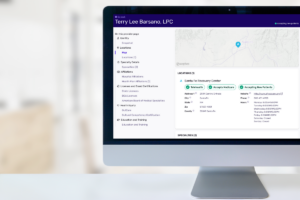Veda recently announced that, with its tenth patent granted by the United States Patent and Trademark Office, it holds the most AI and machine learning patents in the healthcare data industry. Below is a Q&A with Veda’s Co-Founders, Meghan Gaffney, CEO, and Dr. Bob Lindner, Chief Science & Technology Officer, about Veda’s patented AI technology.
Why did you patent your AI?
Meghan: When we founded Veda, we set out to create lasting infrastructure in the healthcare industry that allows accurate data to flow automatically between payers and providers. That meant inventing new ways of processing data that were both secure and accurate, and then publishing our work through the patent process. Ten years later, we are staying true to those objectives— we’ve built AI tools to modernize healthcare and we’ve shared our discoveries through the patent process so our solutions can fuel further innovation.
Bob: We needed to bring a fresh perspective to the problems surrounding provider data that have remained stagnant for over four decades. By creating wholly new approaches to the trillion-dollar data administration problem in healthcare, we knew that our solutions were innovative and unique. So we began early in our company’s history with the patenting of Veda’s technology—protecting our inventions in the short term, while also benefitting all of us in the long run.
Veda’s patents protect our entity resolution engine, AI modeling engine, ML training data process & platform, and web-scale data collection.
How else has Veda committed to AI development?
Bob: I’m an astrophysicist and I built AI tools in radio astronomy before founding Veda. Scientists have been building innovative AI tools for decades and have a cultural rigor that drives them to test and publish their findings.
We’ve recruited a team of PhD scientists—from physics to molecular genetics and astronomy—who help build and test Veda’s in-house LLM technology, train our machine learning models, and develop the infrastructure that is the foundation for Veda’s patented systems.
What makes your AI systems different from others in the industry?
Bob: Our AI is trained on Veda’s proprietary training data, which is ethically sourced and high quality. Our training data is used to fine-tune Veda’s models and help solve critical healthcare-specific tasks with the highest possible performance.
Plus, Veda’s AI models are entirely owned by Veda with no external dependencies. Our application of AI differentiates us from others in the industry because it leverages LLMs and contextual understanding but does not produce hallucinations. We allow the model to select correct answers, not to invent free-form text.
Meghan: Our company is founded on scientific rigor and was built specifically for healthcare from Day 1. We have over 80 combined years of AI expertise, and our commitment to science and data integrity compels us to approach problems differently. It hasn’t always been easy. We did the hard work upfront. We threw out the rule book and asked ourselves, “How do I ensure I can access care?”
Putting ourselves in the patients’ shoes is how we began to turn these challenges on their heads and look at them differently—we’ve calibrated our success to the patient’s ability to use the data to access care. What does that mean technologically? It means our AI systems must provide hallucination-free, predictable, and measurable results because that is what our customers expect and it is what patients deserve.
Bob: It was essential we build the system in a new way. The blend of patents is what makes our AI systems so unique. The patented technology works together, in parallel, to accomplish complex data curation challenges with speed and accuracy that was previously thought impossible.
Which provider data problem is Veda’s AI solving?
Bob: All of them. But the one I’m particularly excited about, and that our most recently granted patent underscores, is our ability to automate intake at scale.
Meghan: Veda’s technology isn’t just a single model. It offers many capabilities working in tandem towards one comprehensible function. There are several foundational data challenges that our technology solves. One of the unique benefits of our patented technology is that it can be assembled in different ways to address many kinds of healthcare industry problems.
Bob: For example, our patented entity resolution system efficiently matches the identity of healthcare providers. The special challenge in this problem is that healthcare providers change lots of their information over the course of their careers, so the system needs to connect their identities while allowing for a normal amount of drift in some fields over time.

Why do you need AI to solve provider data problems?
Bob: We believe only AI can solve the complexities of the provider data problem in the U.S. If manual solutions could successfully process provider data, it would have worked by now. We wouldn’t have legislation, lawsuits, and increasing amounts of member dissatisfaction across the healthcare industry.
Meghan: Veda’s AI can cut through data barriers and ensure that people can access care when they need it the most. That’s why we founded Veda—because everyone deserves access to accurate, up-to-date information that empowers them to get the care they need.
What are the risks of using AI in healthcare and how can they be mitigated?
Meghan: While everyone is looking to AI and automation for solutions, in healthcare the AI isn’t living up to the hype. In a race to reduce costs, many have lost sight of the problem they are trying to solve and have left out foundational components of professional services, actual results, and rigorous testing. In fact, I think the irresponsible development of some AI tools could negatively impact the companies that are taking a transparent and tested path.
For instance, imagine a business trying a new product for the first time, and it doesn’t go well. It breaks, it’s costly, and leaves a negative impression. After that bad experience, you might be reluctant to try another product in that category. This can happen with AI too—if one company delivers poor results, people might dismiss AI solutions altogether and revert to outdated methods, which ultimately hurts innovation.
Bob: We succeed with AI when it is effective, robust, and focused on responsibly making an impact. While there is a risk posed by poorly designed and underperforming tools, I see an opportunity for Veda to prove our integrity to the industry. We’re proud to showcase our patented AI and machine learning solutions, which were developed and tested with an unwavering commitment to scientific rigor and ethical, security-forward principles.
Ready for Veda’s provider data solutions? Contact us.



